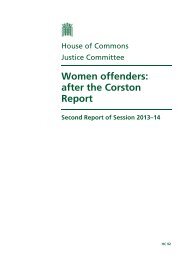IntroductionThe basis for this guideThis guide is based upon <strong>the</strong> views <strong>of</strong> young people from Black <strong>and</strong>minority ethnic (BME) communities – <strong>and</strong> <strong>the</strong> staff from a wide range <strong>of</strong>services who work with <strong>the</strong>m - ga<strong>the</strong>red from a national study <strong>of</strong> <strong>the</strong>irperceptions <strong>and</strong> experience <strong>of</strong> services that can <strong>of</strong>fer support for mentalhealth problems, including specialist child <strong>and</strong> adolescent mental healthservices (CAMHS). The guide also takes account <strong>of</strong> <strong>the</strong> relevant findingsfrom <strong>the</strong> published literature. The study – <strong>Minority</strong> Voices – represents <strong>the</strong>views <strong>of</strong> young people from many different backgrounds, includingrefugees <strong>and</strong> asylum seekers. More details, including a literature review <strong>and</strong>an overview <strong>of</strong> <strong>the</strong> services from which those given in this guide asexamples <strong>of</strong> good practice were selected, can be found in <strong>the</strong> researchreport 1 <strong>and</strong> on <strong>the</strong> YoungMinds website at: www.youngminds.org.uk.What is good practice?Good practice depends upon meeting needs effectively <strong>and</strong> encompasses<strong>the</strong> dimensions <strong>of</strong> what good quality services should be, set out byMaxwell in 1984: 2 Equitable Accessible Acceptable Appropriate Effective Ethical EfficientThese dimensions are inter-related, in that equitable provision is, to agreater or lesser extent, dependent upon matters <strong>of</strong> <strong>access</strong>ibility <strong>and</strong><strong>acceptability</strong>. It cannot be seen as equitable if a service exists but it isknown to be poorly acceptable to <strong>the</strong> population that it serves. Similarly, itis not ethical if a known effective service is only <strong>access</strong>ible to some <strong>and</strong>not o<strong>the</strong>rs. For a service to be effective, it is not enough that <strong>the</strong>interventions delivered are known to be efficacious; <strong>the</strong> service must betaken up <strong>and</strong>, <strong>the</strong>refore, be <strong>access</strong>ible <strong>and</strong> acceptable.In order to describe practice as good, what is done should havedemonstrable positive effects. While evidence for <strong>the</strong> efficacy <strong>of</strong> clearlydefined interventions in child <strong>and</strong> adolescent mental health (CAMH) isgrowing all <strong>the</strong> time, a great deal is still not known, especially about whatworks in terms <strong>of</strong> real life service approaches, as distinct from <strong>the</strong> researchsituation. We are also just beginning to appreciate what can be learnt from<strong>the</strong> clients’ perspective on what works. For <strong>the</strong>se reasons, <strong>the</strong> servicesdescribed in this guide are largely working in ways that indicate goodpractice (<strong>of</strong>ten based on good evidence) but have rarely been subject t<strong>of</strong>ormal evaluation.04
Meeting NeedsThe level <strong>and</strong> type<strong>of</strong> services requiredto meet needsIn order to meet <strong>the</strong> mental health needs <strong>of</strong> anypopulation <strong>of</strong> children <strong>and</strong> adolescents - in a district,living within <strong>the</strong> boundary <strong>of</strong> a local authority etc. –services are required that cover <strong>the</strong> promotion <strong>of</strong>mental health, prevention <strong>and</strong> <strong>the</strong> identification <strong>of</strong>problems, assessment, early <strong>and</strong> timely intervention,treatment <strong>and</strong> longer term management. The kinds <strong>of</strong>services that are likely to benefit children with differentkinds <strong>of</strong> needs have been set out in a four-tieredconceptual framework: essentially, at Tier 1, are allservices that work with children that are not mentalhealth specialist services <strong>and</strong> that may serve topromote child <strong>and</strong> adolescent mental health, toprevent problems from arising <strong>and</strong>/or from becomingentrenched, <strong>and</strong> <strong>of</strong>fer interventions for mild <strong>and</strong>uncomplicated problems. Child <strong>and</strong> adolescentspecialist mental health services at Tiers 2, 3 <strong>and</strong> 4provide for progressively more severe,complex <strong>and</strong>/or rare problems <strong>and</strong> disorders. 3What is effective?A range <strong>of</strong> preventative <strong>and</strong> treatment interventionshas been shown to be effective in improving outcomesfor individual (<strong>and</strong> groups <strong>of</strong>) children, adolescents,<strong>and</strong> <strong>the</strong>ir families. 4 And some recent studies haveprovided evidence for good practice in serviceprovision in meeting <strong>the</strong> mental health needs <strong>of</strong> youngpeople in general (see Appendix I). 5 Young peoplefrom Black <strong>and</strong> minority ethnic communities may havespecifically different needs <strong>and</strong> it is known that <strong>the</strong>seare poorly understood (see Appendix II). 6Issues for young people fromBME communitiesIn common with <strong>the</strong> evidence obtained from youngpeople in general, in <strong>the</strong> <strong>Minority</strong> Voices study thosefrom Black <strong>and</strong> minority ethnic groups reported: A large number <strong>of</strong> preoccupying concerns relatedto education <strong>and</strong> employment; physical health; familyrelationships; past traumatic experiences <strong>and</strong> money<strong>and</strong> finances. Their particular concerns includedexperience <strong>of</strong> discrimination <strong>and</strong> racism;inclusion in <strong>the</strong> local community; <strong>the</strong> uncertainnature <strong>of</strong> any help <strong>the</strong>y may have found, forexample, <strong>the</strong> danger that a voluntary agencymight have to close for lack <strong>of</strong> funds; <strong>and</strong> forrefugees <strong>and</strong> asylum seekers, legal status <strong>and</strong>how long <strong>the</strong>y might stay in <strong>the</strong> UK. A lack <strong>of</strong> awareness among parents – as well asyoung people <strong>the</strong>mselves - <strong>of</strong> what constitutes mentalhealth <strong>and</strong> significant problems, <strong>and</strong> what kinds <strong>of</strong>helping services are available. As a result, appropriatehelp is <strong>of</strong>ten obtained late <strong>and</strong> in response to a crisis. Worries about <strong>the</strong> stigma <strong>of</strong> using a mental healthservice <strong>and</strong> <strong>the</strong> possible lack <strong>of</strong> a confidential service.A particular worry for BME young people isthat if <strong>the</strong>y seek help, <strong>the</strong>y may be viewed as‘going outside <strong>the</strong> family’. Long wait times for appointments; having to travelsome distance to get to a service; services only beingavailable at times that were difficult for <strong>the</strong>m, forexample, clashing with college or school timetables; asense <strong>of</strong> being ‘passed around’ between workers <strong>and</strong>agencies, with no explanation as to why <strong>the</strong>y werebeing referred on; having to tell <strong>the</strong>ir story severaltimes to different pr<strong>of</strong>essionals; a lack <strong>of</strong> informationabout medication, especially on what happens whenthis is discontinued; <strong>and</strong> a lack <strong>of</strong> continuing supportwhen discharged from CAMHS.A particular concern was when no interpreterwas available <strong>and</strong> having to return at a laterdate if <strong>the</strong>y required this support. Poor appreciation by staff in all services <strong>of</strong> mentalhealth needs related to <strong>the</strong> experience <strong>of</strong> youngpeople from BME communities, especially refugees <strong>and</strong>asylum seekers. Along with this, <strong>the</strong>re was greatappreciation by young people when <strong>the</strong>y found<strong>the</strong>mselves in a specialist service that <strong>the</strong>y felt ‘finallyunderstood’ <strong>the</strong>m. A lack <strong>of</strong> choice in <strong>the</strong> gender <strong>and</strong> culturalbackground <strong>of</strong> key members <strong>of</strong> staff.A particular concern was that some youngpeople want someone from <strong>the</strong>ir own culture<strong>and</strong> o<strong>the</strong>rs do not, for fear <strong>of</strong> someone from<strong>the</strong>ir own community hearing <strong>of</strong> <strong>the</strong>irproblems.A lack <strong>of</strong> younger staff from BMEgroups probably deters some young people,who do not feel able to talk about <strong>the</strong>irdifficulties with older members <strong>of</strong> <strong>the</strong>ir owncommunities. Young people’s experience is strongly influencedby <strong>the</strong>ir parents’ views <strong>and</strong> those <strong>of</strong> <strong>the</strong>ircommunities, as well as those <strong>of</strong> <strong>the</strong>ir peer group.A particular concern was that <strong>of</strong>ten staffdo not fully appreciate this or knowhow to work with it in <strong>the</strong> best interests<strong>of</strong> <strong>the</strong> young person. For young people aged 16 <strong>and</strong> over,uncomfortable <strong>and</strong> disturbing experience <strong>of</strong> adultmental health services.05
















